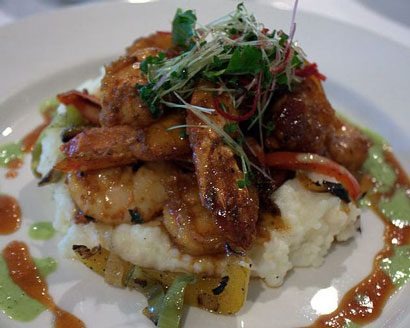The Food Almanac: Friday, February 15, 2013
In The Food Almanac, Tom Fitzmorris of the online newsletter The New Orleans Menu notes food facts and sayings.
Days Until. . .
St. Patrick's Day: 30
St. Joseph's Day: 32
Easter: 44
Annals Of Funny Weather
New Orleans got nine inches of snow on this date in 1895. It caused all the sno-ball stands to close early.
Philosophy Of Taste
Today is the birthday, in 1851, of philosopher Alfred North Whitehead. One of his quotations rings true to me: "We think in generalities, but we live in detail." This is why most restaurateurs don't understand their customers, and vice-versa. Restaurateurs deal in generalities–getting the big job done for the greatest number of people. But the big picture is lost on most restaurant customers. They observe, praise, and complain about small details. The most common complaint I hear from restaurant patrons is that they couldn't get their water, tea, coffee, or cocktail refilled when they wanted it. That's a small issue, but if a restaurant doesn't get that right it causes more upset among customers than, say, the serving of frozen fish does.
The Old Kitchen Sage Sez:
In general, ground beef is a cheap, fatty mess. In particular, a hamburger is pretty good.
Food Through History
One of the most important advances in farming history was the invention of the mechanical reaper. It made the vast acreage of grain in the Midwest and Prairie states (as well as in other grain-growing areas of the world) a breadbasket of incomparable richness. The reaper was invented by Cyrus McCormick, who was born today. His company evolved into International Harvester, which is still around.
Benjamin Franklin ran an ad in Philadelphia today in 1758 for mustard, which he ground and packed in glass bottles. It was the first mustard in America. Franklin, a gastronome of the highest order as well as an entrepreneur, had come to love the stuff on a journey to France.
This is the birthday, in 37 AD, of the Roman Emperor Nero. A real pig, he gave gourmands a bad name. His despicable policies inspired the Book of Revelation.
Food Across America
Today is the birthday of St. Louis, Missouri, founded in 1764. Two famous dishes came from there, and still bear the city's name. The first is St. Louis-style barbecue ribs.Those are big spare ribs cut from down low on the pig. Some barbecue connoisseurs consider them the best cut of ribs. Less well known is an ice cream concoction called a St. Louis Concrete. It's a shake made so thick that if you turn the cup upside down it won't come out. The classic is made with frozen custard.
Today's Flavor
Today is National Grits Day. Grits are ground hominy, which in turn is what's left of a corn kernel after the starches have been dissolved away by a lye solution. Bad start for good food, right? As with most foods, some grits are better than others. The best we know are the stone ground grits from a company called Adluh. In an astounding and mutually annihilating clash of stereotypes, Adluh grits are kosher.
Yellow grits are more fun to eat than white grits, we think. Our standard on grits is that they not be utterly soft, yet be just barely thick enough to be eaten with a fork. Rubbery grits are anathema, as are runny grits. You need salt in there, as well as tremendous amount of butter.
Gourmet Gazetteer
Hominy is forty-four miles northwest of Tulsa, Oklahoma, on OK99 in the Osage Indian Reservation. It's a good-sized town, with about 2600 residents. About a quarter of them are Native Americans. It's the home of a bluegrass music festival every June. There's no question that corn was grown here and turned into hominy at one time, and perhaps still. But oil wells and cattle ranching are the economic story now. The obvious place to dine is the Hominy Diner, right in the center of town. Try the grits.
Food In Music
In 1958 on this date, Jerry Lee Lewis performed Great Balls of Fire on American Bandstand. Over at Nor-Joe Imports, they have a delicious item called fireballs, made by marinating marble-sized lumps of fresh-milk mozzarella cheese in a very spicy olive oil. Vincent's Restaurant puts those fireballs between two pieces of fried eggplant to make what they call an eggplant sandwich.
In other edible music notes, today in 1957 Harry Belafonte hit Number One with the Banana Boat Song, better known as "Day-O!"
Edible Dictionary
hominy, n.–Dried corn kernels treated with a mild lye solution to remove the hulls and germ to avoid sprouting. The name comes from a Native American language, logically enough, since they are the ones who developed the process, using hot water and ash to do the job. When ground, hominy becomes the familiar grits eaten with breakfast in the South. You can buy whole hominy kernels canned or in bags, but it's not much eaten in that form. One dish in which whole hominy is essential is the Southwestrn American stew called posole, very familiar in New Mexico.
Food Namesakes
Sugar Ray Leonard scored a knockout in the third round of a boxing match against Bruce Finch on this date in 1982. . . Sherry Jackson, movie actress, was born today in 1942. . . Frank "Home Run" Baker, who has a rare double food name, was purchased by the Yankees today in 1916. . . Josh Sole, an Italian rugby player, was born in New Zealand today in 1980.
Words To Eat By
"You don't develop good teeth by eating mush."–Earl Henry "Red" Blaik, football coach, born today in 1897.
Words To Drink By
"What you eat and drink is 50 percent of life."–Gerard Depardieu.
